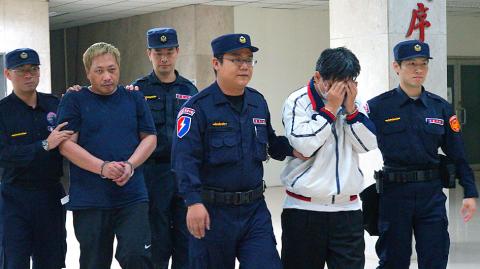The man who allegedly made the suitcase explosive devices that were planted on a moving high-speed train and outside a legislator’s office said yesterday that it was the “poor state of society” that prompted him to make the devices.
During questioning at the New Taipei District Prosecutors’ Office, Hu Tsung-hsien (胡宗賢) admitted to making the devices, but contended that they would not have exploded, investigators said.
They quoted Hu as saying that the bombs were only meant to “scare” the public and that he did not have specific targets.

Photo: CNA
One of the devices was planted in a toilet on a high-speed train bound for Taipei and the other was left outside Chinese Nationalist Party (KMT) Legislator Lu Chia-chen’s (盧嘉辰) office in Tucheng District (土城), New Taipei City (新北市).
Chu Ya-tung (朱亞東), a suspected accomplice in the failed bombing attempts, told the investigators that he was paid by Hu to purchase the suitcases and later left them at locations that Hu designated.
Hu also directed him to purchase a silver Mitsubishi minivan that was registered to another individual, surnamed Lai (賴), Chu said.
The vehicle was then used to transport the explosives.
Chu said he did not know there were explosives in the suitcases.
He said he “felt weird” after leaving the suitcases on the high-speed train and that he stumbled when putting the other two suitcases outside the legislator’s office because he panicked.
Investigators added that Hu, a lawyer, and Chu, a taxi driver, had some kind of employer-employee relationship.
They said Chu had borrowed money from Hu from time to time and that before the bombing attempts, Hu had promised Chu more than NT$100,000 (US$3,350) per month if Chu would work for him.
The two men, both in their 40s, fled to China’s Guangdong Province on Friday on one-way tickets soon after allegedly planting the devices. Hu also took with him more than NT$1 million in cash, the investigators said.
They were repatriated to Taiwan on Tuesday with the help of the Chinese authorities and held incommunicado.
Fang Nan-shan (方南山), Hu’s lawyer, said that he would appeal against the incommunicado ruling.
Fang said his client had answered all the questions put to him and there would be no risk of him colluding on testimony if he was released on bail.

Alain Robert, known as the "French Spider-Man," praised Alex Honnold as exceptionally well-prepared after the US climber completed a free solo ascent of Taipei 101 yesterday. Robert said Honnold's ascent of the 508m-tall skyscraper in just more than one-and-a-half hours without using safety ropes or equipment was a remarkable achievement. "This is my life," he said in an interview conducted in French, adding that he liked the feeling of being "on the edge of danger." The 63-year-old Frenchman climbed Taipei 101 using ropes in December 2004, taking about four hours to reach the top. On a one-to-10 scale of difficulty, Robert said Taipei 101

Nipah virus infection is to be officially listed as a category 5 notifiable infectious disease in Taiwan in March, while clinical treatment guidelines are being formulated, the Centers for Disease Control (CDC) said yesterday. With Nipah infections being reported in other countries and considering its relatively high fatality rate, the centers on Jan. 16 announced that it would be listed as a notifiable infectious disease to bolster the nation’s systematic early warning system and increase public awareness, the CDC said. Bangladesh reported four fatal cases last year in separate districts, with three linked to raw date palm sap consumption, CDC Epidemic Intelligence

Taiwanese and US defense groups are collaborating to introduce deployable, semi-autonomous manufacturing systems for drones and components in a boost to the nation’s supply chain resilience. Taiwan’s G-Tech Optroelectronics Corp subsidiary GTOC and the US’ Aerkomm Inc on Friday announced an agreement with fellow US-based Firestorm Lab to adopt the latter’s xCell, a technology featuring 3D printers fitted in 6.1m container units. The systems enable aerial platforms and parts to be produced in high volumes from dispersed nodes capable of rapid redeployment, to minimize the risk of enemy strikes and to meet field requirements, they said. Firestorm chief technology officer Ian Muceus said

MORE FALL: An investigation into one of Xi’s key cronies, part of a broader ‘anti-corruption’ drive, indicates that he might have a deep distrust in the military, an expert said China’s latest military purge underscores systemic risks in its shift from collective leadership to sole rule under Chinese President Xi Jinping (習近平), and could disrupt its chain of command and military capabilities, a national security official said yesterday. If decisionmaking within the Chinese Communist Party has become “irrational” under one-man rule, the Taiwan Strait and the regional situation must be approached with extreme caution, given unforeseen risks, they added. The anonymous official made the remarks as China’s Central Military Commission Vice Chairman Zhang Youxia (張又俠) and Joint Staff Department Chief of Staff Liu Zhenli (劉振立) were reportedly being investigated for suspected “serious